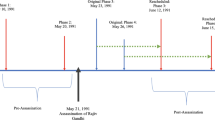Abstract
While we frequently hope electoral democracy can serve as an important constraint on corruption, there are good reasons to think that such might not be the case. This paper analyzes two closely-related questions: should we expect voters to punish corrupt politicians or parties at the polls, and should we expect such influences to check corruption generally? While there have been clear-cut cases in which such punishments have been massive and decisive, they are much the exception. Indeed, a variety of factors having to do with corruption as a concept and as a political issue, the nature of competitive electoral politics, and more recent economic and political trends reshaping important aspects of liberal democracy, all point toward a pessimistic assessment. Ideas for changing that state of affairs are few, because the difficulties reside less at the level of fixable “problems” and more with the inherent workings of liberal political and economic systems. Efforts to improve the quality of news coverage and civic education, however, and any prospects for strengthening and deepening civil society, may hold out some hope for the longer term.
Similar content being viewed by others
Notes
Ironically, transparency measures likely make matters worse, as any donor brave or foolish enough to contribute to a powerful Senator’s or Representative’s opponents must do so on the record, in ways open to scrutiny by the incumbent’s staff. After the incumbent’s re-election, those donors may find their telephone calls going unanswered… More recent trends toward channels for large and often undisclosed contributions may undercut some of that logic, but will do little to enhance voters’ ability to police the political process.
In the United States as well as in other democracies, “opposition research”—digging up unflattering or scandalous information on the other parties’ leaders and candidates—has become big business over the past generation. Personal peccadillos of all sorts are now likely to come to the surface in any campaign, and even a candidate who did nothing more serious in life than squash his best friend’s pet frog are likely to confront those events again, in the form of allegations of a lack of moral fiber.
So, ironically, does the fact that Argentina’s gradual roll-back of 1990s-era privatizations has had little or no effect on corruption (see, for example, [11]).
References
Acemoglu, D., & Robinson, J. A. (2012). Why Nations Fail. New York: Random House/Crown Business.
Agence France Presse. 2013. “France’s Far Right in Test of New Found Respectability.” Online at http://www.expatica.com/fr/news/french-news/france-s-far-right-in-test-of-new-found-respectability_268071.html (Viewed 1 July 2013).
CMFR (Center for Media Freedom and Responsibility). 2013. “Ampatuan Watch.” Ampatuan Trial Watch, June 14. Online at CMFR’s excellent website tracking developments in the massacre cases, at http://www.cmfr-phil.org/ampatuanwatch/ (Viewed 30 June 2013).
Dye, T. R., Zeigler, H., & Schubert, L. (2012). The Irony of Democracy. Boston: Wadsworth.
Guillan Montero, A. (2011). As If: The Fiction of Executive Accountability and the Persistence of Corruption Networks in Weakly Institutionalized Presidential Systems.” Argentina (1989–2007)” . Unpublished PhD thesis, Georgetown University, Washington, DC,
Johnston, M. (2013). Corruption, Contention, and Reform: The Power of Deep Democratization. Cambridge: Cambridge University Press, (in press).
Johnston, M. (2005). Syndromes of Corruption: Wealth, Power, and Democracy. Cambridge: Cambridge University Press.
Johnston, Michael, and Sahr J. Kpundeh. 2002. “Building a Clean Machine: Anti-Corruption Coalitions and Sustainable Reforms.” World Bank Institute Working Paper number 37208 (December).
Judt, T. (2005). Postwar: A History of Europe Since 1945. London: Penguin.
Lessig, L. (2011). Republic, Lost: How Money Corrupts Congress—and a Plan to Stop It. New York: Twelve Books.
Manzetti, L. (2009). Neoliberalism, Accountability, and Reform Failures in Emerging Markets: Eastern Europe, Russia, Argentina, and Chile in Comparative Perspective. University Park, PA.: Pennsylvania State University Press.
Politifact.com. 2013. “Forty-Seven Percent of Members of Congress Are Millionaires.” Online at http://www.politifact.com/georgia/statements/2013/feb/04/rob-woodall/congress-millionaires-club/ (Viewed June 30, 2013).
Schaffer, Frederic Charles. 2002. “Disciplinary Reactions: Alienation and the Reform of Vote Buying in the Philippines.” Paper presented at a conference on “Trading Political Rights: The Comparative Politics of Vote Buying”, Cambridge, MA (August 26–27). Online: http://web.mit.edu/CIS/pdf/Schaffer%20-%20Disciplinary%20Reactions.pdf (Viewed 30 June 2013).
Stiglitz, J. E. (2012). The Price of Inequality: How Today’s Divided Society Endangers Our Future. New York: W.W. Norton.
Wedel, J. R. (2009). Shadow Elite: How the World’s New Power Brokers Undermine Democracy, Government, And The Free Market. New York: Basic Books.
Weisbrot, Mark, Luis Sandoval, and Carla Parades-Druet. 2006. “An Analysis of Discrepancies in the Mexican Presidential Election Results.” Washington, DC: Center for Economic and Policy Research. Online at http://www.cepr.net/documents/mexico_discrepancies_2006_08.pdf (Viewed 30 June 2013).
Author information
Authors and Affiliations
Corresponding author
Rights and permissions
About this article
Cite this article
Johnston, M. How do I vote the scoundrels out? Why voters might not punish corrupt politicians at the polls. Crime Law Soc Change 60, 503–514 (2013). https://doi.org/10.1007/s10611-013-9477-3
Published:
Issue Date:
DOI: https://doi.org/10.1007/s10611-013-9477-3




